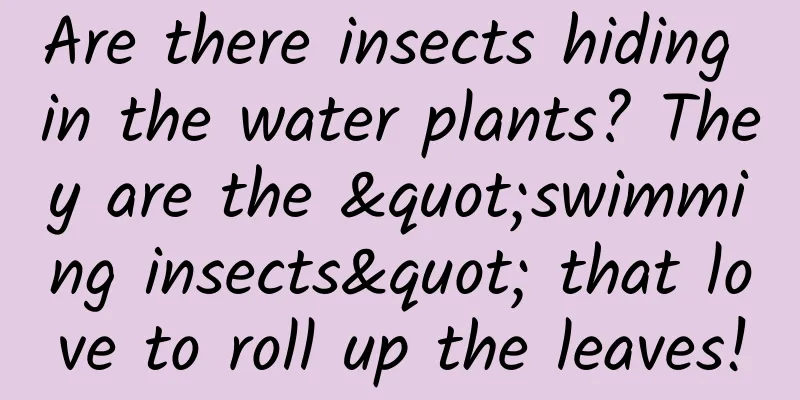Are there insects hiding in the water plants? They are the "swimming insects" that love to roll up the leaves!

|
Are there insects hiding in the water plants? They are the "swimming insects" that love to roll up the leaves! When you are playing by the water and see green water plants, have you ever thought that there are insects hiding in them? In fact, most of the time, there are insects hiding in them that feed on water plants, and they can even "swim" freely in the water! The scientific name of this insect is Parapoynx diminutalis, which belongs to the order Lepidoptera, the family Pyralidae. The larvae grow in water and have a large appetite. They are good at feeding on the Hydrilla verticillata, which plays an important role in maintaining the health and stability of the ecosystem. They often stick several leaves together into a tube and hide in it (see Figure 1), so they are also called "leaf rollers" by the people. Figure 1 The camouflage of the small tube moth The life history of the small tube moth As a completely "metamorphosis" type of insect, the small tube water moth can be divided into four stages according to its morphology: larval stage, pupation stage, adult stage and egg stage. The larvae are light yellow in color and covered with bristles (Figure 2a). Before pupating, the larvae roll the leaves of the verticillata into a hollow shape and attach them to the plant stems and then pupate inside (Figure 2b). After they emerge from the wings, they become moths. The wings of the adults are white with light brown markings (Figure 2c). They usually lay eggs on emergent plants or on the water surface (Figure 2d). The entire life cycle from egg to adult is about 25-41 days. Figure 2 Life cycle of the small tube moth Hydrilla verticillata harvester The larvae of the water moth have leaf-rolling behavior and like to curl the leaves of these plants on aquatic plants. This behavior can cause the plant leaves to deform and they will eat a lot of leaves, but this will seriously affect the growth and development of the plants. In addition, the adult state of the water moth is a moth. During the flight, the moth may hatch the eggs of the water moth on nearby aquatic plants, but this will form a new source of insects and further increase the degree of harm caused by the water moth. According to the survey, 70%-80% of farmers in the main freshwater shrimp farming provinces of Hubei, Jiangsu, Guangdong and Anhui will choose Hydrilla verticillata as the breeding grass species. Therefore, for my country's aquaculture industry, the water moth has become the main pest of Hydrilla verticillata. What are the methods for preventing and controlling water moth? Biological control: This is the mainstay of control of water moth. Biopesticide strains of Bacillus thuringiensis produce proteins that are toxic to water moth larvae, which, when consumed, bind to the midgut and kill the larvae. A commercially available Bacillus thuringiensis product (Btk) has been shown to cause 80% mortality of water moth larvae in about four days. Physical control: Since the larvae and moths of the small tube water moth have strong phototropism, ultraviolet black lights and incandescent lamps can be set up for trapping and killing. However, it should be noted that since the small tube water moth has a weak phototaxis, the effect of light trapping may be unstable. Chemical control: Chemical agents can be used to control water moth. Phoxim is an organophosphorus pesticide widely used in agricultural production. It has the characteristics of high efficiency, low toxicity and broad spectrum. It is currently used in aquaculture to kill fish parasites, such as anchorhead barracuda and ringworm. Phoxim solution in the range of 0.001-10 mg/L has a toxic effect on water moth and can effectively protect Hydrilla verticillata. Author: Li Xiayu (graduate student of School of Life Sciences, Hubei University) Scientific review: Xu Letian (Professor and doctoral supervisor at Hubei University) Planning: Zhao Qingjian, Wu Yuetong Editor: Lu Jingwen (internship) |
<<: The sun is becoming increasingly "violent", how can spacecraft "defend themselves"?
>>: What kind of cat is this! I can't see or pet it, but I have to clean up its poop every day
Recommend
Electric Technology Car News: Can the latecomer Maxus D90 successfully break through in the fiercely competitive large 7-seater SUV market?
Power, handling and chassis are considered the th...
They are most afraid of you going to the hospital...
“As long as you can hold it in, there is no need ...
2020, a survival guide for marketing departments
Today’s content is about the iteration of the mar...
Implanting AI engine Amap's future goal is to create a living map
At the Yunqi Conference in August this year, Alib...
After refuting the relationship rumors, Zhang Ming En appeared in Hu Bingqing's residential area and left immediately when he saw the candid photos!
On June 23, Zhang Ming'en was photographed ag...
Case analysis: How to increase user growth?
During the survey, we found that “growth means” i...
Humans should be grateful for the asteroids’ “kindness of not killing”, but they should also be able to blow them up!
Not long ago, a somewhat sci-fi news became a hot...
13 lessons to cultivate a beautiful back and swan neck, easily appear 5 cm taller, and shape a perfect body curve
13 lessons to cultivate a beautiful back and swan...
Why can’t user portraits be implemented?
User portraits , as an effective tool for outlini...
If you want to learn how to cook at home, please learn how to read recipes first!
Mixed Knowledge Specially designed to cure confus...
How to write copy with user thinking?
Good copywriting is not about expressing your own...
Understand the principles of Douyin advertising in one article
This article will use a case to fully interpret t...
App Store September review rejection reasons ranking! Apple's review focus turns out to be these...
As an App promoter , one of the most painful thin...
Biopharmaceutical companies carry out major strategic transformation: reversing the dilemma of digital transformation
Download the report: Add 199IT’s official WeChat ...
To master the promotion of Bilibili, just read this article!
Bilibili , the main battlefield to capture young ...




![[Live] 58 Shen Jian: Structural design of database horizontal segmentation under high concurrency of billions of data volumes](/upload/images/67ebd62fa1057.webp)




